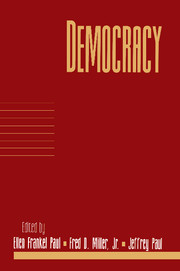Book contents
- Frontmatter
- Contents
- Introduction
- Acknowledgments
- Contributors
- The Very Idea of Popular Sovereignty: “We the People” Reconsidered
- Quasi-Rights: Participatory Citizenship and Negative Liberties in Democratic Athens
- Is There a Duty to Vote?
- Postmodern Liberalism and the Expressive Function of Law
- Democratic Epistemology and Accountability
- Political Quality
- Why Deliberative Democracy Is Different
- The Institutions of Deliberative Democracy
- Democracy as a Telos
- Radical Democracy, Personal Freedom, and the Transformative Potential of Politics
- Democracy and Value Pluralism
- The Problem of Russian Democracy: Can Russia Rise Again?
- Index
Postmodern Liberalism and the Expressive Function of Law
Published online by Cambridge University Press: 03 May 2010
- Frontmatter
- Contents
- Introduction
- Acknowledgments
- Contributors
- The Very Idea of Popular Sovereignty: “We the People” Reconsidered
- Quasi-Rights: Participatory Citizenship and Negative Liberties in Democratic Athens
- Is There a Duty to Vote?
- Postmodern Liberalism and the Expressive Function of Law
- Democratic Epistemology and Accountability
- Political Quality
- Why Deliberative Democracy Is Different
- The Institutions of Deliberative Democracy
- Democracy as a Telos
- Radical Democracy, Personal Freedom, and the Transformative Potential of Politics
- Democracy and Value Pluralism
- The Problem of Russian Democracy: Can Russia Rise Again?
- Index
Summary
INTRODUCTION
In 1992, the city of Boulder, Colorado, passed an ordinance forbidding discrimination against homosexuals in employment and housing. Two years later, voters in the state of Colorado passed a constitutional amendment forbidding the passage of local ordinances prohibiting this form of discrimination. The constitutional amendment did not mandate discrimination against homosexuals; it merely nullified ordinances such as Boulder's. The amendment was later struck down by the U.S. Supreme Court as unconstitutional.
On the face of it, the controversy surrounding the ordinance and the constitutional amendment was a tempest in a teapot. Boulder, the home of the University of Colorado, enjoys a reputation as a tolerant city. Discrimination against homosexuals in employment and housing did not appear to be a significant problem in the city. To be sure, victims of this form of discrimination did not see it that way, but even if such discrimination is wrong, it does not follow that there should be a city ordinance against it. The law cannot right all wrongs, and discrimination ordinances of this sort are generally relatively easy to evade. So what is the point?
Similarly, at the state level, the need for the constitutional amendment was not evident. Although Aspen and Denver had similar ordinances, there was no evidence that other municipalities were about to pass some form of the Boulder initiative. Why should the citizens of Colorado care about city ordinances such as these?
- Type
- Chapter
- Information
- Democracy , pp. 87 - 109Publisher: Cambridge University PressPrint publication year: 2000
- 1
- Cited by



